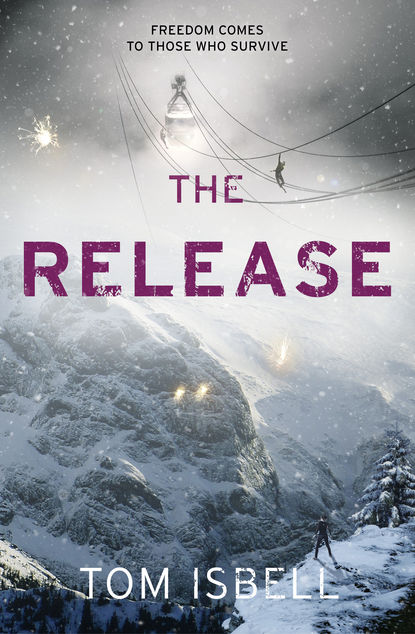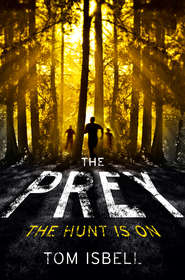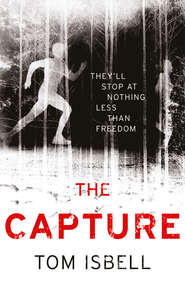По всем вопросам обращайтесь на: info@litportal.ru
(©) 2003-2024.
✖
The Release
Настройки чтения
Размер шрифта
Высота строк
Поля
“Anything?” he asked. The same question we asked one another every night.
“Some yellow a couple hours ago.”
“More or less than last night?”
“Definitely more. And getting closer.”
It was not the answer anyone wanted to hear.
I tossed some wood into the stove and poked the logs. As I stretched out before the flames, pinpricks of heat danced up my toes and fingers. Argos circled and lay down. He was practically fully grown now, the scars from various wolf attacks pockmarking his fur like badges of honor.
Cat entered and we went through the same series of questions. Any yellow? How many? How close? That kind of thing.
The fact was, we were fixated on wolves—could think of little else. They circled us each night, taunting us with their howls, their greenish-yellow eyes poking through the dark like devil fingers. There was never a time when they weren’t on our minds.
“How much longer?” I asked, absently petting Argos.
“Till what?”
“Till they finish off the corpses?”
Cat shrugged. “Another day. Maybe two.”
He bent down and picked up two rocks—one quartz, one flint—and began knapping them together, making arrowheads. He held the flint by wedging it between his armpit and artificial limb. His movements were so effortless, you almost got the feeling he’d been missing an arm his entire life. Typical Cat.
“And when they’re done with the corpses?” I asked.
He shrugged. “I guess they’ll look somewhere else.” The fire crackled and Cat knapped the rocks. Then he turned to Flush and asked, “We’re still waiting for spring?”
“As soon as the snow melts,” Flush said.
“We can’t leave any sooner?”
“Not as long as there are LTs who can’t get out of bed.”
“We could build a sled and drag them along.”
Flush shook his head. “Better to wait until we can all walk on our own.”
I knew what was going on in Cat’s mind. It wasn’t just wolves he was thinking about. We had seen for ourselves the realities of the Republic of the True America: Hunters tracking down Less Thans, experiments on Sisters, Brown Shirts locking up LTs and letting them die in their bunks.
Since Chancellor Maddox had somehow escaped the avalanche—Dr. Gallingham, too—we knew we couldn’t remain in Libertyville a second longer than necessary. Our only salvation—and curse—was the snow, which kept the Brown Shirts away … but also kept us captive.
To lift people’s spirits—and also celebrate a year’s worth of birthdays—we’d decided to throw a party the next night. It wouldn’t solve our problems, but maybe it would get our minds off wolves and a dwindling food supply—at least for one evening.
When I climbed into bed, Cat continued to strike rocks, and Flush and Twitch were still poring over numbers. As I settled into sleep, it wasn’t wolves or Chancellor Maddox or Dr. Gallingham I thought about.
It was Hope. I hadn’t seen her since we’d rescued her from the bunker. For the past eight weeks, she had spent her days hunting game in the foothills, returning only when the sun was setting and she could cloak herself in darkness, closeting herself in her tent on the far edge of Libertyville. I wondered when I’d see her again.
If I’d see her again.
My eyes drifted shut and I fell into a deep sleep, only partially aware of the wolves’ haunting howls from the other side of the ring of fire.
2. (#u3239141b-d125-57b8-8ebc-3ff8b1da0d77)
AFTERNOON SUNLIGHT BOUNCES OFF the snow as Hope field dresses a squirrel. Her hands and knife move in an acrobatic flurry. She’s done it so many times, it’s become a kind of dance. Knife in the underside, tug at the skin, slice off the front legs, remove the skin, dig out the entrails, chop off the head, cut the back feet, pull out the organs—done. She can do it in her sleep.
Hope does all this in the privacy of an aspen grove. Anything to hide herself. While she’s never considered herself a vain person, there is something about these scars—these twin Xs on her cheeks—she finds disgusting. Repulsive, even. They’re like brands for marking livestock, as if she were someone else’s property. The thought sickens her.
It’s why she keeps to herself. Why she wears a hoodie and pulls the drawstrings tight. Why she avoids the stares of well-meaning friends.
Why she avoids Book.
Hunting is her refuge. It not only lets her provide food for the others, it gives her an excuse to get away from camp. And the fact is, she’s good at it. Setting traps and tracking prey have always been her specialty. She can thank her father for that.
It’s the only thing she can thank him for. Now that she knows he collaborated with the enemy, working alongside Dr. Gallingham and injecting patients with experimental drugs, she finds it best not to think of him. Yes, she’ll use the skills he taught her, but that’s it. No more honoring his memory.
She plops the skinned squirrel in her pack, resets the trap, and notices the late-afternoon sun sneaking past the tree trunks, announcing the coming dusk. Time to return to Libertyville. Skeleton Ridge is no place to be after dark.
Her lips purse and she gives a sharp whistle. A moment later, a whistle answers. It’s Diana, hunting on the other side of the aspens. That’s their signal to start back down the mountain.
Hope reaches back and removes the pair of skis strapped to her back—skis she made from birch planks. She slips her boots into the bindings, pulls them taut, and takes off down the mountain.
Her hair is longer now, black and flowing, and the crisp winter wind sails through it. It’s not as long as her mother’s was, but it’s getting there. Closer to how it was before Chancellor Maddox ordered it chopped off way back when.
Partway down the mountain, something catches Hope’s eye: two dark objects, not much bigger than her hand, lying still and silent atop the snow. She angles the skis in that direction, shooshing to a stop. It’s obvious what she’s looking at: two field mice, their bodies stiff from death. Hope looks around. The mice aren’t from any trap, and it’s unlikely they died from natural causes one right next to the other. So what are they doing here? More importantly, why haven’t they been eaten?
She grabs one by the tail and lifts it in the air.
“What’ve you got there?” Diana asks, appearing at her side.
“Nothing,” Hope says, startled. She throws the stiff rodents into her pack. “Just a couple of mice.”
“Better than nothing. And it wouldn’t hurt for you to eat some of that.”
“We’ll see.”
“I mean it.”
“I know.”
It’s an ongoing debate. Diana is convinced Hope isn’t eating enough, and Hope tells her there’s hardly enough food for the sick and wounded, let alone the healthy ones.
She’s still thinking about the mice when Diana says, “Book was asking about you last night.”
“So?”
“So what I do I tell him?”
Другие электронные книги автора Tom Isbell
The Prey




 0
0







